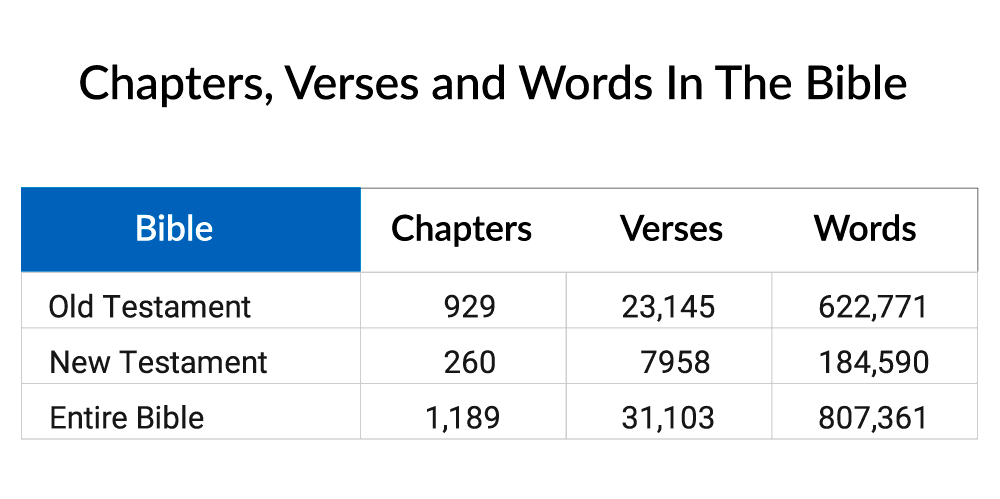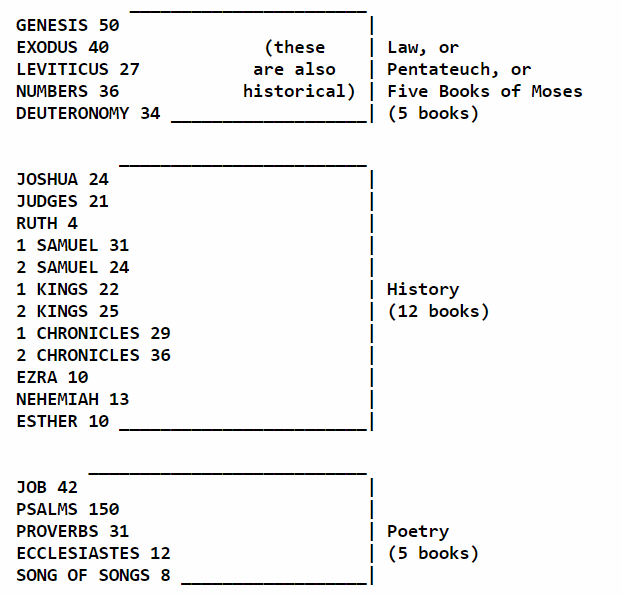Exploring the Bible: How Many Chapters in the Bible?
The Bible, an ancient and revered text, holds immense significance for billions of people around the world. Its teachings, stories, and wisdom have guided humanity for centuries. One fundamental aspect of the Bible is its structure, with chapters and verses serving as the building blocks for its contents. In this article, we embark on a journey to unravel the mystery of the Bible’s structure and answer a common question: How many chapters are there in the Bible? Join us as we explore this intriguing aspect of the Holy Scriptures.
Understanding the Structure
Before we delve into the exact number of chapters in the Bible, let’s grasp the fundamental structure of this sacred text. The Bible is typically divided into two major sections: the Old Testament and the New Testament. These sections house a collection of books, each with its own unique message and significance.

The Old Testament, often regarded as the foundation of the Bible, contains a wealth of historical accounts, laws, prophecies, and poetry. It’s comprised of numerous books, ranging from Genesis to Malachi. Each of these books is further divided into chapters and verses, allowing for precise referencing and study.
Total Number of Chapters
Now, let’s get to the heart of the matter – how many chapters are there in the Bible? The answer may surprise you. The Bible, as a whole, contains a whopping 66 books, with 39 in the Old Testament and 27 in the New Testament. These books are further divided into chapters and verses, designed to aid readers in pinpointing specific passages, making it easier to reference and study the Scriptures.
In the Old Testament, there are a total of 929 chapters. The New Testament, on the other hand, consists of 260 chapters. When you add these numbers together, you arrive at a grand total of 1,189 chapters in the entire Bible. This division into chapters allows for a systematic approach to reading, studying, and interpreting the Bible’s rich content.
Old Testament Chapters
The Old Testament, with its historical narratives, prophetic writings, and poetic books, contains 929 chapters distributed across 39 books. Notable books in the Old Testament include Genesis, with 50 chapters, and Psalms, boasting 150 chapters of poetic praise and reflection. Other significant books like Exodus, Isaiah, and Jeremiah contribute to the Old Testament’s comprehensive structure.
New Testament Chapters
In contrast, the New Testament is home to 260 chapters, spread across 27 books. The Gospels – Matthew, Mark, Luke, and John – are foundational in the New Testament, each presenting a unique perspective on the life and teachings of Jesus Christ. The Book of Acts narrates the early history of the Christian Church, while the Epistles offer guidance and wisdom to believers. The final book, Revelation, contains 22 chapters of apocalyptic visions and prophecies.
Understanding the precise count of chapters in the Old and New Testaments not only aids scholars and theologians but also allows individuals to explore the Bible’s contents more effectively, whether for personal reflection, study, or guidance in their faith journey.
Historical Significance
The division of the Bible into chapters is not a recent development. It dates back to the 13th century when Stephen Langton, the Archbishop of Canterbury, introduced these divisions. His goal was to facilitate reference and citation of specific passages within the Bible. These chapter divisions have since become an integral part of the Bible’s structure, guiding scholars, theologians, and readers in their exploration of the Scriptures.
Chapters serve as essential markers for navigation, aiding in locating verses and passages swiftly. They also allow for a systematic approach to reading and studying the Bible, breaking down the vast content into manageable sections. This structure has been instrumental in theological debates, sermon preparations, and scholarly research for centuries.

Why Chapters Matter
Chapters in the Bible play a crucial role in enhancing the accessibility and usability of this sacred text. They enable readers to find and reference specific verses with ease, making it an invaluable tool for personal study, devotion, and research.
Chapters also facilitate the exploration of various themes and narratives within the Bible. For instance, you can easily locate the Sermon on the Mount in the Book of Matthew (Chapter 5-7) or the Ten Commandments in the Book of Exodus (Chapter 20). This organizational structure aids in understanding the context and significance of individual passages.
Moreover, chapters provide a foundation for sermon preparation and teaching in religious settings. They allow pastors and educators to break down the Bible into manageable sections for in-depth analysis and discussion, ensuring that the message is conveyed effectively.
In summary, chapters in the Bible are not arbitrary divisions but rather a well-thought-out system that enhances the understanding, accessibility, and study of this sacred text. Whether you are a devout believer, a scholar, or someone curious about the Bible’s teachings, these chapters are your gateway to its profound wisdom and insights.
Variations and Translations
It’s worth noting that while the Bible’s chapter divisions are generally consistent, there can be slight variations in different Bible translations. These variations are more pronounced when it comes to the Old Testament. For instance, the Hebrew Bible, also known as the Masoretic Text, has a slightly different arrangement of chapters and verses compared to many Christian Old Testaments. This can result in discrepancies in chapter counts.
One significant example is the Book of Psalms. In the Hebrew Bible, Psalms is divided into 150 individual poems, each regarded as a separate chapter. However, many Christian Bibles divide some of these poems into multiple chapters, resulting in a higher chapter count for Psalms in Christian versions.
These variations are a result of differences in translation and interpretation, highlighting the importance of choosing a Bible translation that aligns with your preferences and beliefs.
Additional Insights
Beyond the chapter counts, the Bible contains a wealth of unique features within its chapters and verses. Here are a few intriguing facts to pique your interest:
- Psalm 119: This chapter is unique in that it consists of 176 verses, making it the longest chapter in the Bible. It’s a beautiful acrostic poem, with each section starting with a successive letter of the Hebrew alphabet.
- Shortest Chapter: The shortest chapter in the Bible is Psalm 117, with only two verses. Despite its brevity, it carries a powerful message of praise.
- Chapter 3, Verse 16: John 3:16 is perhaps the most famous verse in the Bible, emphasizing God’s love and the gift of salvation through Jesus Christ. It’s found in the New Testament, in the Book of John, Chapter 3, Verse 16.
- Chapter 1, Verse 1: The Bible’s opening verse, Genesis 1:1, marks the beginning of the entire biblical narrative: “In the beginning, God created the heavens and the earth.”
These are just a few examples of the remarkable content within the Bible’s chapters and verses, each contributing to the depth and richness of this sacred text.
Conclusion: In this exploration of the Bible’s chapters, we’ve uncovered not only the total number of chapters but also their historical significance and why they matter in the study of the Scriptures. We’ve delved into variations in chapter divisions and highlighted intriguing facts about specific chapters and verses.




